Music Festivals and Tourist Attraction: Key Event Studies Concepts
VerifiedAdded on 2020/02/18
|6
|1112
|215
Essay
AI Summary
This paper delves into the realm of music festivals, examining their role as tourist attractions and the factors that influence attendance. It highlights the importance of music in event management, discussing both the pull and push factors that motivate individuals to attend such events. The analysis explores the seek-escape theory and identifies key aspects affecting attendance, including socialization, family togetherness, novelty, relaxation, entertainment, cultural experiences, and unique event attributes. Furthermore, the paper addresses the difficulties encountered in managing music events, such as team skill deficiencies, communication breakdowns, labor division issues, and potential licensing challenges. References from Abreu-Novais & Arcodia (2013) to Hayes (2014) support the discussion.
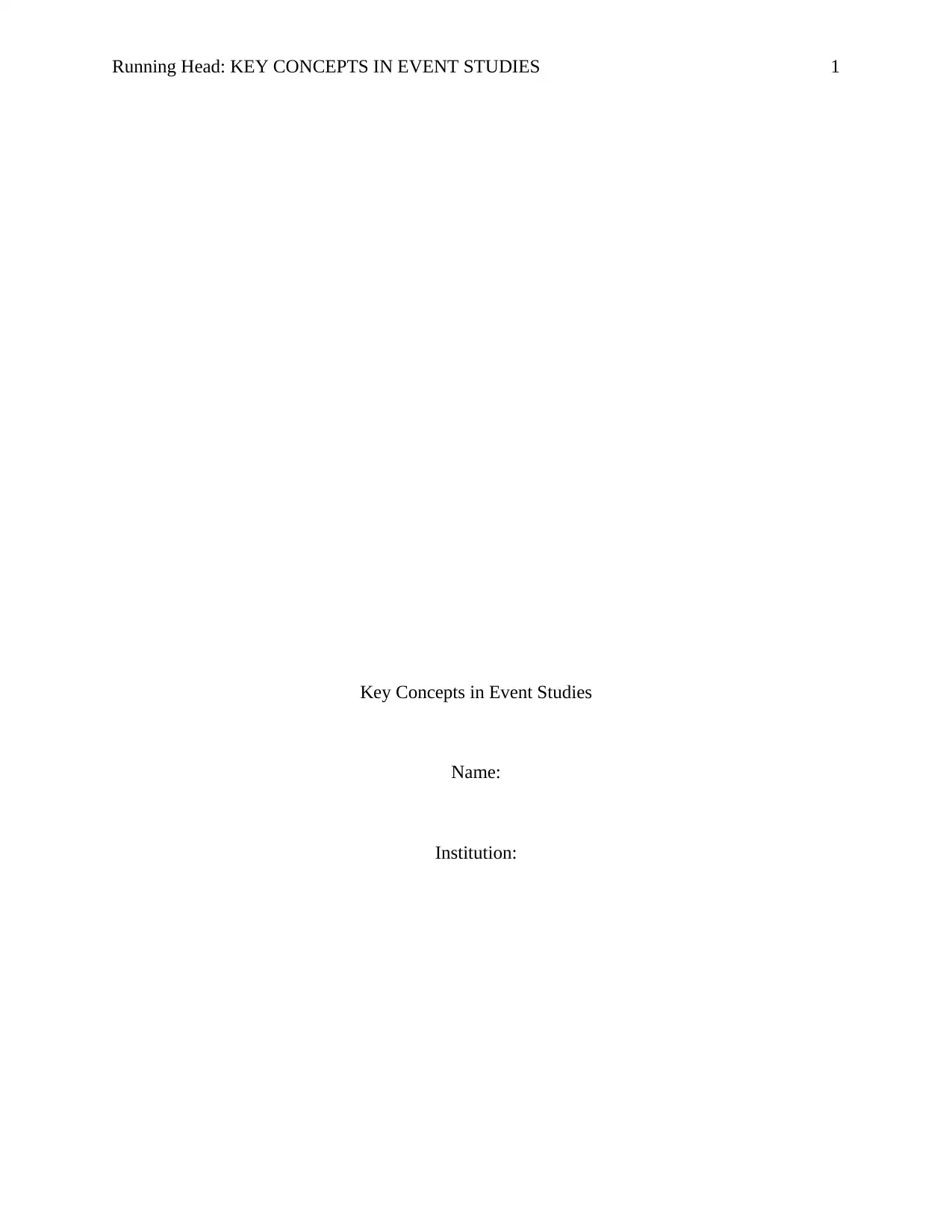
Running Head: KEY CONCEPTS IN EVENT STUDIES 1
Key Concepts in Event Studies
Name:
Institution:
Key Concepts in Event Studies
Name:
Institution:
Paraphrase This Document
Need a fresh take? Get an instant paraphrase of this document with our AI Paraphraser
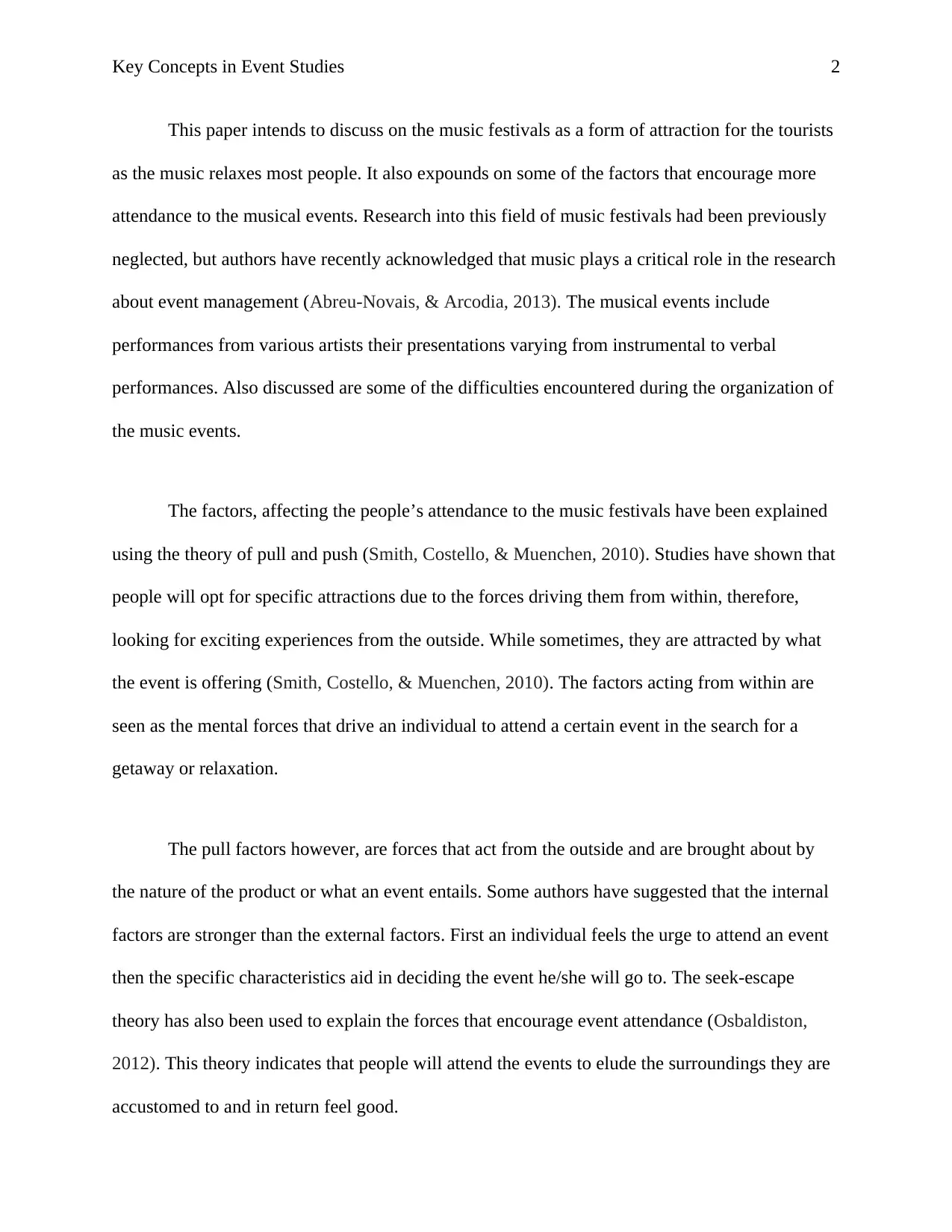
Key Concepts in Event Studies 2
This paper intends to discuss on the music festivals as a form of attraction for the tourists
as the music relaxes most people. It also expounds on some of the factors that encourage more
attendance to the musical events. Research into this field of music festivals had been previously
neglected, but authors have recently acknowledged that music plays a critical role in the research
about event management (Abreu-Novais, & Arcodia, 2013). The musical events include
performances from various artists their presentations varying from instrumental to verbal
performances. Also discussed are some of the difficulties encountered during the organization of
the music events.
The factors, affecting the people’s attendance to the music festivals have been explained
using the theory of pull and push (Smith, Costello, & Muenchen, 2010). Studies have shown that
people will opt for specific attractions due to the forces driving them from within, therefore,
looking for exciting experiences from the outside. While sometimes, they are attracted by what
the event is offering (Smith, Costello, & Muenchen, 2010). The factors acting from within are
seen as the mental forces that drive an individual to attend a certain event in the search for a
getaway or relaxation.
The pull factors however, are forces that act from the outside and are brought about by
the nature of the product or what an event entails. Some authors have suggested that the internal
factors are stronger than the external factors. First an individual feels the urge to attend an event
then the specific characteristics aid in deciding the event he/she will go to. The seek-escape
theory has also been used to explain the forces that encourage event attendance (Osbaldiston,
2012). This theory indicates that people will attend the events to elude the surroundings they are
accustomed to and in return feel good.
This paper intends to discuss on the music festivals as a form of attraction for the tourists
as the music relaxes most people. It also expounds on some of the factors that encourage more
attendance to the musical events. Research into this field of music festivals had been previously
neglected, but authors have recently acknowledged that music plays a critical role in the research
about event management (Abreu-Novais, & Arcodia, 2013). The musical events include
performances from various artists their presentations varying from instrumental to verbal
performances. Also discussed are some of the difficulties encountered during the organization of
the music events.
The factors, affecting the people’s attendance to the music festivals have been explained
using the theory of pull and push (Smith, Costello, & Muenchen, 2010). Studies have shown that
people will opt for specific attractions due to the forces driving them from within, therefore,
looking for exciting experiences from the outside. While sometimes, they are attracted by what
the event is offering (Smith, Costello, & Muenchen, 2010). The factors acting from within are
seen as the mental forces that drive an individual to attend a certain event in the search for a
getaway or relaxation.
The pull factors however, are forces that act from the outside and are brought about by
the nature of the product or what an event entails. Some authors have suggested that the internal
factors are stronger than the external factors. First an individual feels the urge to attend an event
then the specific characteristics aid in deciding the event he/she will go to. The seek-escape
theory has also been used to explain the forces that encourage event attendance (Osbaldiston,
2012). This theory indicates that people will attend the events to elude the surroundings they are
accustomed to and in return feel good.
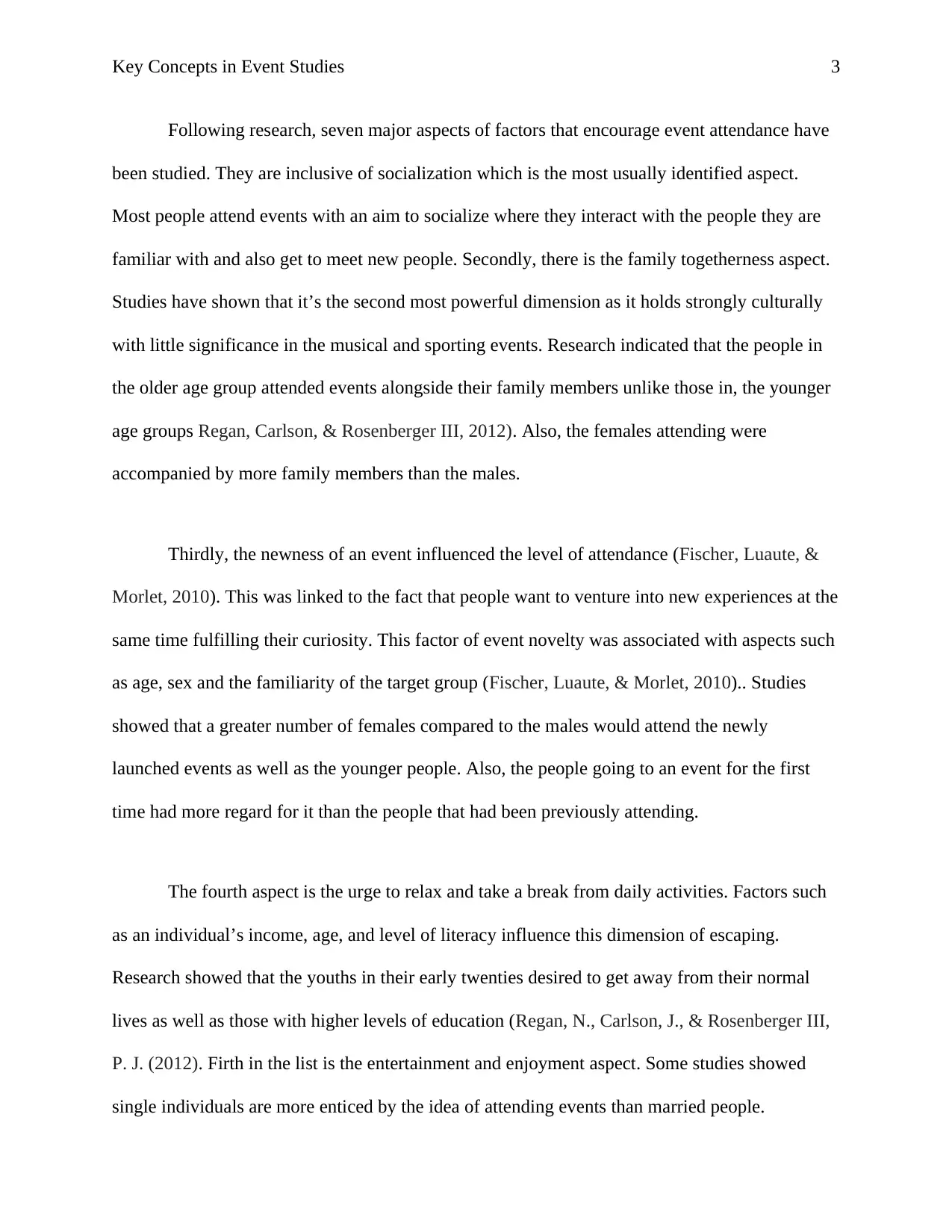
Key Concepts in Event Studies 3
Following research, seven major aspects of factors that encourage event attendance have
been studied. They are inclusive of socialization which is the most usually identified aspect.
Most people attend events with an aim to socialize where they interact with the people they are
familiar with and also get to meet new people. Secondly, there is the family togetherness aspect.
Studies have shown that it’s the second most powerful dimension as it holds strongly culturally
with little significance in the musical and sporting events. Research indicated that the people in
the older age group attended events alongside their family members unlike those in, the younger
age groups Regan, Carlson, & Rosenberger III, 2012). Also, the females attending were
accompanied by more family members than the males.
Thirdly, the newness of an event influenced the level of attendance (Fischer, Luaute, &
Morlet, 2010). This was linked to the fact that people want to venture into new experiences at the
same time fulfilling their curiosity. This factor of event novelty was associated with aspects such
as age, sex and the familiarity of the target group (Fischer, Luaute, & Morlet, 2010).. Studies
showed that a greater number of females compared to the males would attend the newly
launched events as well as the younger people. Also, the people going to an event for the first
time had more regard for it than the people that had been previously attending.
The fourth aspect is the urge to relax and take a break from daily activities. Factors such
as an individual’s income, age, and level of literacy influence this dimension of escaping.
Research showed that the youths in their early twenties desired to get away from their normal
lives as well as those with higher levels of education (Regan, N., Carlson, J., & Rosenberger III,
P. J. (2012). Firth in the list is the entertainment and enjoyment aspect. Some studies showed
single individuals are more enticed by the idea of attending events than married people.
Following research, seven major aspects of factors that encourage event attendance have
been studied. They are inclusive of socialization which is the most usually identified aspect.
Most people attend events with an aim to socialize where they interact with the people they are
familiar with and also get to meet new people. Secondly, there is the family togetherness aspect.
Studies have shown that it’s the second most powerful dimension as it holds strongly culturally
with little significance in the musical and sporting events. Research indicated that the people in
the older age group attended events alongside their family members unlike those in, the younger
age groups Regan, Carlson, & Rosenberger III, 2012). Also, the females attending were
accompanied by more family members than the males.
Thirdly, the newness of an event influenced the level of attendance (Fischer, Luaute, &
Morlet, 2010). This was linked to the fact that people want to venture into new experiences at the
same time fulfilling their curiosity. This factor of event novelty was associated with aspects such
as age, sex and the familiarity of the target group (Fischer, Luaute, & Morlet, 2010).. Studies
showed that a greater number of females compared to the males would attend the newly
launched events as well as the younger people. Also, the people going to an event for the first
time had more regard for it than the people that had been previously attending.
The fourth aspect is the urge to relax and take a break from daily activities. Factors such
as an individual’s income, age, and level of literacy influence this dimension of escaping.
Research showed that the youths in their early twenties desired to get away from their normal
lives as well as those with higher levels of education (Regan, N., Carlson, J., & Rosenberger III,
P. J. (2012). Firth in the list is the entertainment and enjoyment aspect. Some studies showed
single individuals are more enticed by the idea of attending events than married people.
⊘ This is a preview!⊘
Do you want full access?
Subscribe today to unlock all pages.

Trusted by 1+ million students worldwide
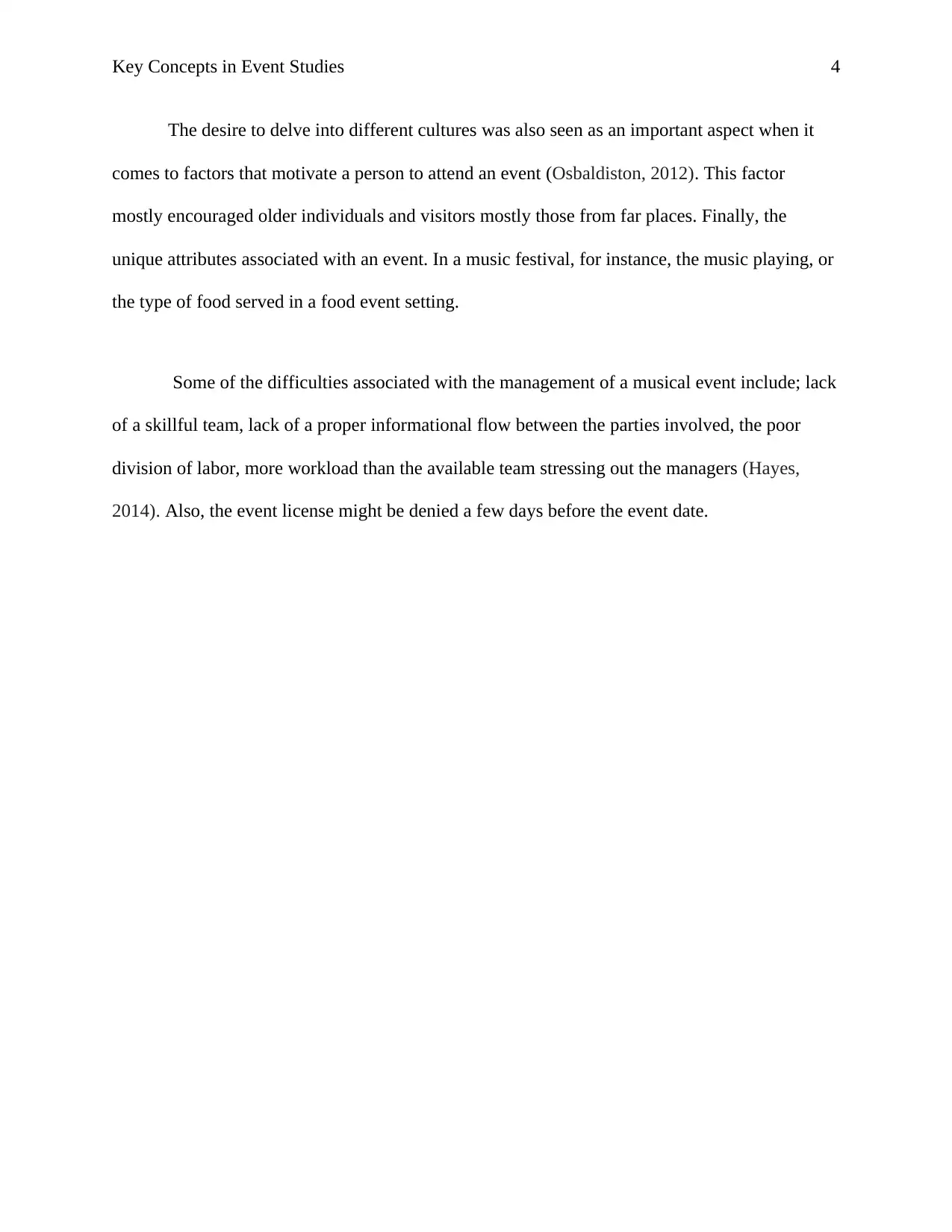
Key Concepts in Event Studies 4
The desire to delve into different cultures was also seen as an important aspect when it
comes to factors that motivate a person to attend an event (Osbaldiston, 2012). This factor
mostly encouraged older individuals and visitors mostly those from far places. Finally, the
unique attributes associated with an event. In a music festival, for instance, the music playing, or
the type of food served in a food event setting.
Some of the difficulties associated with the management of a musical event include; lack
of a skillful team, lack of a proper informational flow between the parties involved, the poor
division of labor, more workload than the available team stressing out the managers (Hayes,
2014). Also, the event license might be denied a few days before the event date.
The desire to delve into different cultures was also seen as an important aspect when it
comes to factors that motivate a person to attend an event (Osbaldiston, 2012). This factor
mostly encouraged older individuals and visitors mostly those from far places. Finally, the
unique attributes associated with an event. In a music festival, for instance, the music playing, or
the type of food served in a food event setting.
Some of the difficulties associated with the management of a musical event include; lack
of a skillful team, lack of a proper informational flow between the parties involved, the poor
division of labor, more workload than the available team stressing out the managers (Hayes,
2014). Also, the event license might be denied a few days before the event date.
Paraphrase This Document
Need a fresh take? Get an instant paraphrase of this document with our AI Paraphraser
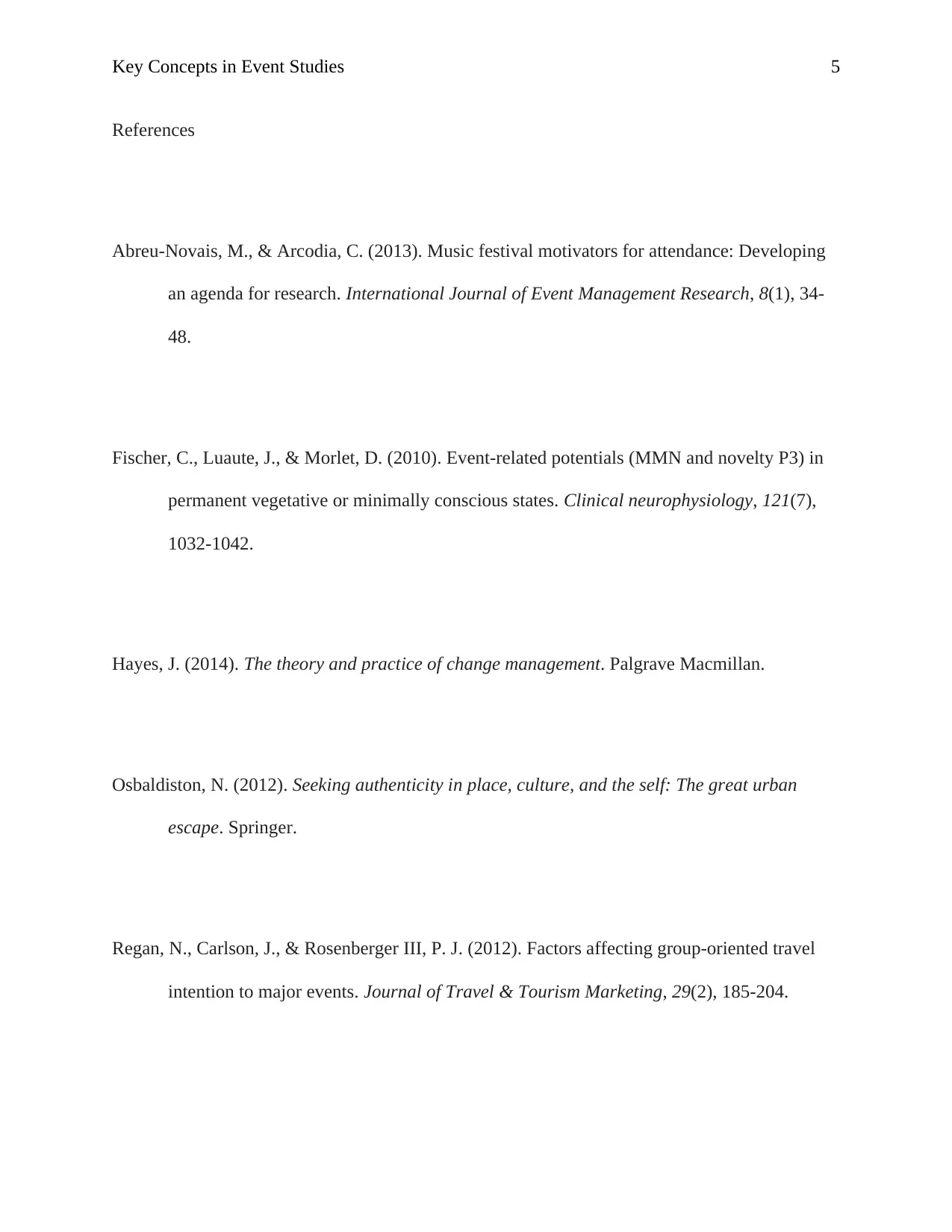
Key Concepts in Event Studies 5
References
Abreu-Novais, M., & Arcodia, C. (2013). Music festival motivators for attendance: Developing
an agenda for research. International Journal of Event Management Research, 8(1), 34-
48.
Fischer, C., Luaute, J., & Morlet, D. (2010). Event-related potentials (MMN and novelty P3) in
permanent vegetative or minimally conscious states. Clinical neurophysiology, 121(7),
1032-1042.
Hayes, J. (2014). The theory and practice of change management. Palgrave Macmillan.
Osbaldiston, N. (2012). Seeking authenticity in place, culture, and the self: The great urban
escape. Springer.
Regan, N., Carlson, J., & Rosenberger III, P. J. (2012). Factors affecting group-oriented travel
intention to major events. Journal of Travel & Tourism Marketing, 29(2), 185-204.
References
Abreu-Novais, M., & Arcodia, C. (2013). Music festival motivators for attendance: Developing
an agenda for research. International Journal of Event Management Research, 8(1), 34-
48.
Fischer, C., Luaute, J., & Morlet, D. (2010). Event-related potentials (MMN and novelty P3) in
permanent vegetative or minimally conscious states. Clinical neurophysiology, 121(7),
1032-1042.
Hayes, J. (2014). The theory and practice of change management. Palgrave Macmillan.
Osbaldiston, N. (2012). Seeking authenticity in place, culture, and the self: The great urban
escape. Springer.
Regan, N., Carlson, J., & Rosenberger III, P. J. (2012). Factors affecting group-oriented travel
intention to major events. Journal of Travel & Tourism Marketing, 29(2), 185-204.

Key Concepts in Event Studies 6
Smith, S., Costello, C., & Muenchen, R. A. (2010). Influence of push and pull motivations on
satisfaction and behavioral intentions within a culinary tourism event. Journal of Quality
Assurance in Hospitality & Tourism, 11(1), 17-35.
Smith, S., Costello, C., & Muenchen, R. A. (2010). Influence of push and pull motivations on
satisfaction and behavioral intentions within a culinary tourism event. Journal of Quality
Assurance in Hospitality & Tourism, 11(1), 17-35.
⊘ This is a preview!⊘
Do you want full access?
Subscribe today to unlock all pages.

Trusted by 1+ million students worldwide
1 out of 6
Related Documents
Your All-in-One AI-Powered Toolkit for Academic Success.
+13062052269
info@desklib.com
Available 24*7 on WhatsApp / Email
![[object Object]](/_next/static/media/star-bottom.7253800d.svg)
Unlock your academic potential
Copyright © 2020–2026 A2Z Services. All Rights Reserved. Developed and managed by ZUCOL.





